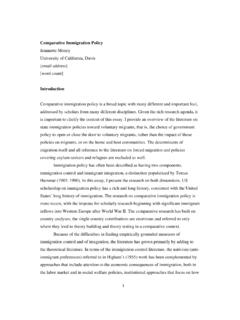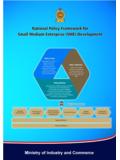Transcription of Foreign Policy Analysis and Rational Choice Models
1 1 Foreign Policy Analysis and Rational Choice Models Bruce Bueno de Mesquita New York University/Stanford University [email address] [word count] Introduction The study of Foreign Policy as a Rational Choice process is undergoing a sea change in its focus and in its impact on Policy choices. At least since the end of World War II, Foreign Policy thinking has been dominated by a realist (or neorealist) perspective in which states are taken as the relevant unit of Analysis . There has been a shift away from that orientation within the Rational Choice community concerned with Foreign Policy . This has resulted both in the development of game theory Models , of direct use in helping to inform Foreign Policy choices, and in the uncovering of new insights that are reshaping thinking about crucial Foreign Policy questions.
2 Here I review the relevant literature in terms of its analytic contributions and its place in helping to shape Policy decisions. Before doing so, however, I digress briefly to explain the fundamentals behind Rational Choice Models . What is a Rational Actor Model? Although the Rational actor perspective on Foreign Policy has been around for several decades (some early examples include Russett 1967; Brams 1975; Zagare 1977; Altfeld and Bueno de Mesquita 1979; Wittman 1979), misunderstandings and misplaced critiques of the approach persist, hindering thoughtful and informed discussion. With that in mind, I begin with what the Rational actor model is not before explaining briefly what it is. In an otherwise superb study by the historian Drake (2002), he states concisely common misconceptions of the Rational actor model.
3 He writes: 2In its purest form, the Rational Actor approach presumes that such a figure [as Constantine] has complete freedom of action to achieve goals that he or she has articulated through a careful process of Rational Analysis involving full and objective study of all pertinent information and alternatives. At the same time, it presumes that this central actor is so fully in control of the apparatus of government that a decision once made is as good as implemented. There are no staffs on which to rely, no constituencies to placate, no generals or governors to cajole. By attributing all decision making to one central figure who is always fully in control and who acts only after carefully weighing all options, the Rational Actor method allows scholars to filter out extraneous details and focus attention on central issues.
4 (2002:24) It is the state-centrism of much international relations scholarship that is behind the survival of caricatures such as Drake s. Since realists drew their core insights by examining the history of European monarchies in the post-Westphalian era, they described a political process that emphasizes the national interest in a way that is reasonably in accord with leadership incentives in fairly centralized monarchies, but not in accord with incentives either in rigged-election autocracies or in democracies, the most common forms of government in the contemporary world (Acemoglu and Robinson 2001; Bueno de Mesquita et al. 2003). That is, they assumed that the desires of the monarch could be equated with the national interest, following the logic of Louis XIV s famous declaration, L tat c est moi.
5 This implicit assumption tends to result in deductions that turn out to be inconsistent with observed patterns of action in contemporary international politics. In contrast, political economy Rational actor Models that look within as well as between states provide insights into Foreign Policy that are supported empirically across all regime types. Many of these insights do not follow logically if a state-centric perspective is adopted. A critical purpose of this essay is to present evidence regarding this claim. From the perspective of Rational Choice theorists, any Rational actor model assumes that actors (such as decision makers) make choices that the actors believe will lead to the best feasible outcomes for them as defined by their personal values or preferences.
6 The interests of the decision makers may or may not include enhancing something called the national interest. Decision makers connect alternatives consistently ( transitively) in relations of preference or indifference; they take constraints, such as impediments in nature ( where they are located geographically) and the anticipated 3actions of others into account and act in a manner that is consistent with their desires and beliefs. Such Models , for instance, examine the past actions and anticipated actions of staffs, constituencies, generals, and governors in trying to understand international conflict choices. This literature, focused on the principal agent problem, is at the core of diversionary war theories (Levy 1989; Russett 1990; Morgan and Bickers 1992; Smith 1996; Leeds and Davis 1997) and bureaucratic or interest group analyses (Allison 1972; Goldstein and Freeman 1991) of Foreign affairs, and is also fundamental to the selectorate theory that assesses leader incentives under different institutional arrangements (Bueno de Mesquita et al.)
7 2003). These and other Rational actor literatures make clear that decision makers even central decision makers do not have complete freedom of action and they are not in full control. They must consider whatever constraints block the path to the outcome they desire and adjust their behavior accordingly, often abandoning their most preferred goal in favor of pursuit of an attainable second or third best. Sometimes they end up with their least preferred outcome even though they chose rationally at every step along the way. Furthermore, Rational decision makers do not exhaustively consider all possible alternatives if the cost of doing so exceeds the marginal gain. To do so, in fact, would be irrational as they would knowingly be wasting resources without a reasonable expectation of their recovery.
8 The assumption of rationality is just a starting point for constructing theories. The rationality condition sets out the theorist s view of how people are likely to select actions given their motivations or preferences; it says nothing about the content of those preferences (Zagare 1990; Jackman 1993). Constructivist Models are more suitable for trying to ascertain how preferences form. Rational Choice Models are better suited as Models of action. The contents of assumed preferences vary from theory to theory. International relations Models vary in what they assume as the ultimate goal or set of goals of their actors. These goals may be national security, national power, personal wealth, control over international rules, norms, or policies, personal power, survival in office, decision making discretion, attaining heaven in an afterlife, or a host of other possibilities.
9 The actors may be individual citizens, elites, leaders, states, nongovernmental organizations, international governmental organizations, multinational 4corporations, or many other entities. Thus, the assumption of rationality neither limits the goals to be studied nor the identity of the actors pursuing those goals. It only limits how actors choose actions given their desires and beliefs. It certainly does not require nor does it disallow the notion that the state is a Rational , unitary actor. Because space is limited and the bulk of growth in the Rational actor study of international conflict relies on game theory Models , I focus on those Models here. I divide my review along two dimensions: (1) game theoretic studies that treat states as Rational unitary actors, and (2) studies that look within states at Rational choices against the backdrop of domestic politics.
10 Modeling War Choices: The Most Dangerous Foreign Policy Loosely speaking, we can think of war from the perspective of states in two analytic contexts. We can examine the initiation, escalation, and termination of disputes from the perspective of the war-of-attrition model or from the viewpoint of Models that see war and peace as choices over risky lotteries. In a war of attrition, the good in dispute often is indivisible. In these winner-take-all contests, one party either quits at the outset or the combatants face a problem akin to an ascending price auction. When do you stop bidding if each bid incurs a sunk cost? The answer, of course, is to bid as long as the expected benefit is greater than or equal to the marginal expected cost. Naturally, this can lead to a war that persists until one or the other side has its resources completely exhausted.






